This year, Christmas is coming early with the release of the seventh season of Natsume Yuujinchou on October 7th. This is the perfect time for a little retrospective on this quiet, irreplaceable triumph of a series.
“Natsume Reiko was always, always alone.”
This is what the powerful yōkai Madara tells Reiko’s grandson, Natsume Takashi, after he accidentally frees the yōkai from a forest shrine.
Natsume-kun can relate. Like his grandmother Reiko, he was born with the supernatural ability to see and interact with yōkai, ayakashi, and other monsters of Japanese folklore. This ability has always alienated Natsume from other human beings. When yōkai scared him as a boy and he cried out in fear, others called him a liar. Orphaned as a toddler, Natsume spent his entire life leading up to high school being passed from relative to relative. At last, he’s landed with a kind older couple who live in his grandmother’s hometown in rural Kyushu. He is determined not to creep them out.
Natsume hopes to hide his abilities from everyone, but avoiding yōkai in the countryside proves a challenge. The mountains and forests and farms and traditional houses here have not changed much for centuries. In rural Japan, the world is older, the trees wilder, the ghosts stronger; superstitions hold genuine merit. It isn’t hard to believe that moss-covered jizo statues might wink at you, or that the crows in the branches are sentient and gossiping like aunties, or that the fox darting across the road could actually be a centuries-old shapeshifter.
Drawn to Natsume’s resemblance to his grandmother as much as his spiritual power, the yōkai of the countryside won’t leave Natsume alone. Thanks to his encounter with Madara, Natsume discovers that, as a girl, his grandmother captured the names of yōkai in a calligraphy book she called The Book of Friends. Doing so allowed her to control them, and ever since all the local yōkai have wanted one of two things: to get their names back, or to steal the book and gain power over powerful spirits.
But Natsume, an introspective, painfully lonely orphan, sees right through Madara’s interpretation of his grandmother as a yōkai-hunting villain. His grandmother Reiko, if she was anything like him, didn’t want servants. She wanted friends. She was just very terrible at making them. Natsume resolves to return the names to the yōkai his grandmother wronged.
Many anime ghost stories are set in the countryside. But Book of Friends, though rife with ghosts, is far from a horror story. Instead, it is one of the coziest, most comforting anime of all time, a slow-burn coming-of-age story that champions decency—human and inhuman both—above all. Sure, you may be a monster, but that need not determine what kind of person you are.
A Little About Yōkai…
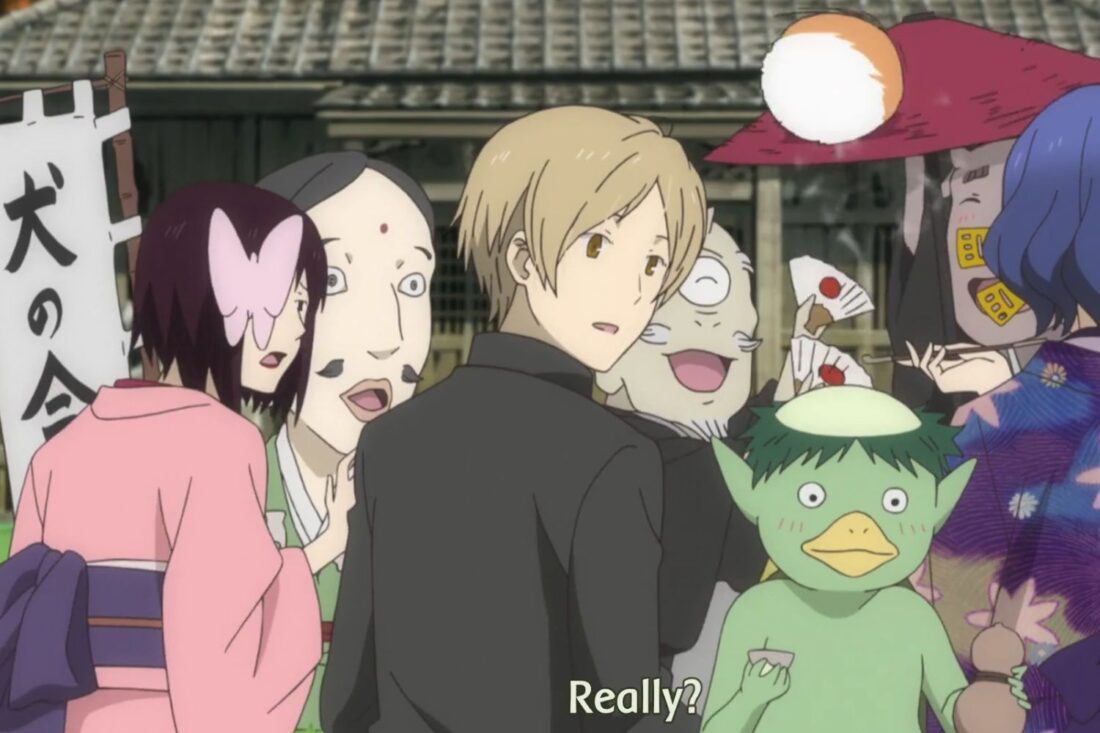
When I meet people in Japan, they are often surprised by my infatuation with yōkai. I wear bakeneko shoes and kappa tees; I created a map of Japan that distinguishes the 47 prefectures not by cities or landmarks, but by a representative yōkai said to live in the region. It hangs proudly on my wall, and every time I visit a new prefecture, I color in a new yōkai. I have a yōkai tattoo (it features sunekosuri, or “shin-rubber,” a catlike yōkai that trips people in alleyways after dark). I am not the only foreigner infatuated with yōkai by any means. Why is that?
Well, for one thing, yōkai are damned interesting creatures, as weird as they are diverse. You’ve got the giant rattling skeleton Gashadokuro, as big as Godzilla, who haunts former battlefields and eats people for fun (I have a Gashadokuro poster hanging over my toilet, naturally). But then you’ve got doll-like household spirits called Zashiki-Warashi who may break a few pots but mostly take care of your home. And you’ve got Amabie, a three-legged bird-beaked fish lady who became popular during the pandemic because her name and image are said to prevent the spread of plagues (the handwashing signs at my workplace feature cute clip-art of Amabie, who reminds kids to use soap.)
There are yōkai severed horse heads that hang from tree limbs and knock riders from their steeds for fun, and yōkai whose sole purpose is to lick the hair from empty washtubs, and somewhere in Ehime there’s a yōkai rooster that spits fire. And objects or animals that live to be 100 years old become tsukumogami, gaining either a soul or sentience or both, which means there are also yōkai karakasa kozō, a one-eyed umbrella who hops around on one sandaled foot, and mokumokuren, eyes that grow on the paper screens of neglected sliding walls.
The creativity is endless, and the morality of each yōkai varies. They are as changeable as the seasons, as unpredictable as typhoons. For every monster that emerges from a toilet and kills those who dare use the wrong-colored toilet paper, there’s an old clay cup hiding in the crawlspace that will sacrifice itself to protect the household, shattering as it absorbs an incoming curse or disaster.
Of course, the general weirdness of yōkai means that even the potentially docile ones can be frightening. But in many stories, yōkai are more misunderstood than malicious. Natsume can’t help but give yōkai the benefit of the doubt even when they terrify him. After all, how many people have been afraid of him based on assumptions that he was either crazy or a liar or both? And fortunately, his spiritual power allows him to punch them pretty damn hard when the need arises, too. And then he either runs or apologizes, depending on the circumstances. Socializing is never simple for a guy like Natsume.
Becoming A Good Friend
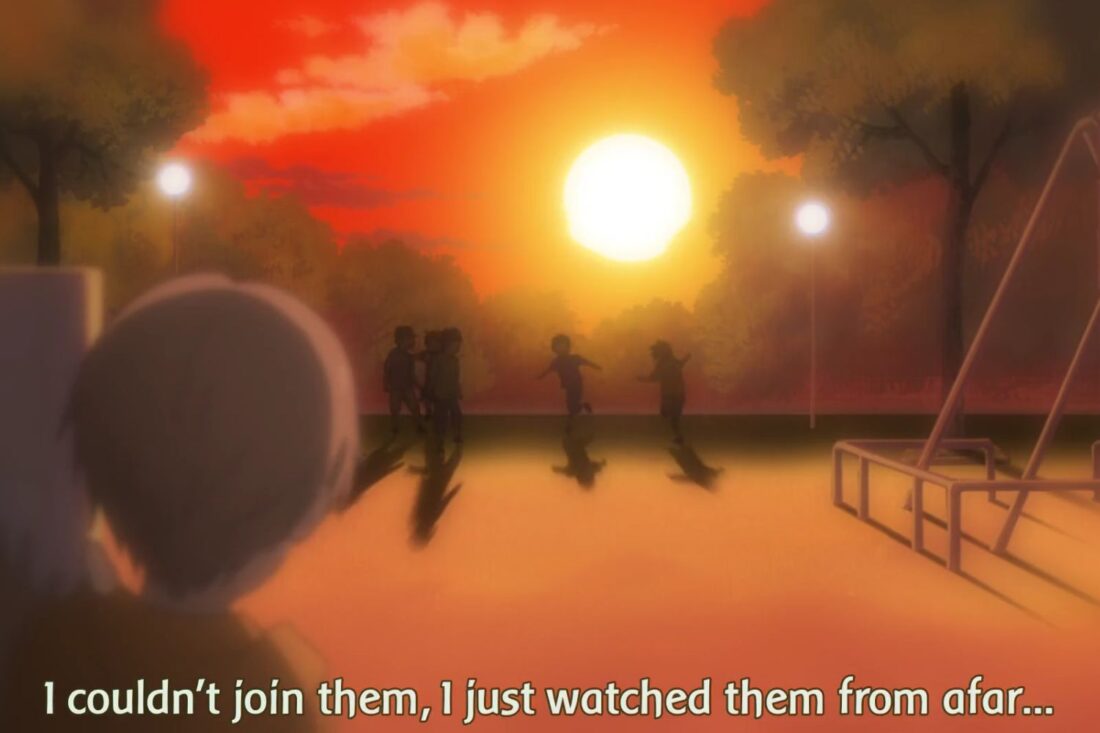
“He doesn’t know how to be a friend,” Madara explains to Natsume’s human classmate Tanuma in the second season finale, after Natsume yet again darts off into danger without asking for help. It isn’t an insult, but a fact. Natsume has always seen himself as an inconvenience, and he would sooner chop off his own leg than lay his burdens on someone else. More than rejection, he fears inflicting pain on those he cares about.
Tanuma, the son of a Buddhist monk, can’t see yōkai, but he can sense them and sometimes sees a haze where they stand. More than anyone else, he understands Natsume. And unlike Natsume, he understands that good friends share their suffering, and in doing so, alleviate it. But it has never occurred to Natsume that anyone would want to help him with his problems. Natsume’s gradual willingness to accept help from others is a fundamental aspect of his character growth.
Natsume is too considerate, initially to the point of self-harm. In the first season, he values himself so little that he throws himself headfirst into danger. After all, if he dies, no one will miss him, right? This is why, when he first meets Madara, he tells him, “Protect me from other yōkai and help me return their names and, when one of them kills me, you can have the Book of Friends.” But Natsume also can’t help being empathetic, and in seeking to understand yōkai and people he finds himself less alone. After he forms bonds with people and monsters in his midst, Natsume continues to throw himself into danger, but because he wants to live. His kind nature hasn’t changed, but his motivations have. He is a wonderful protagonist.
Eventually he accepts that some of the yōkai can be his friends, and that there are people in this countryside town who appreciate him. In addition to Takumi, Natsume befriends Natori, a famous actor and secret exorcist who sees supernatural beings clearly thanks to a cursed birthmark of a lizard that travels around his body. There’s Taki, a girl who learned to draw magical yōkai-revealing circles from her grandfather. There are classmates who know nothing of his yōkai relations but appreciate his kind, spacey nature. Natori envies Natsume’s power over spirits, but Natsume never sees himself as having any. Instead, he sees himself as befriending people. Very, very odd people.
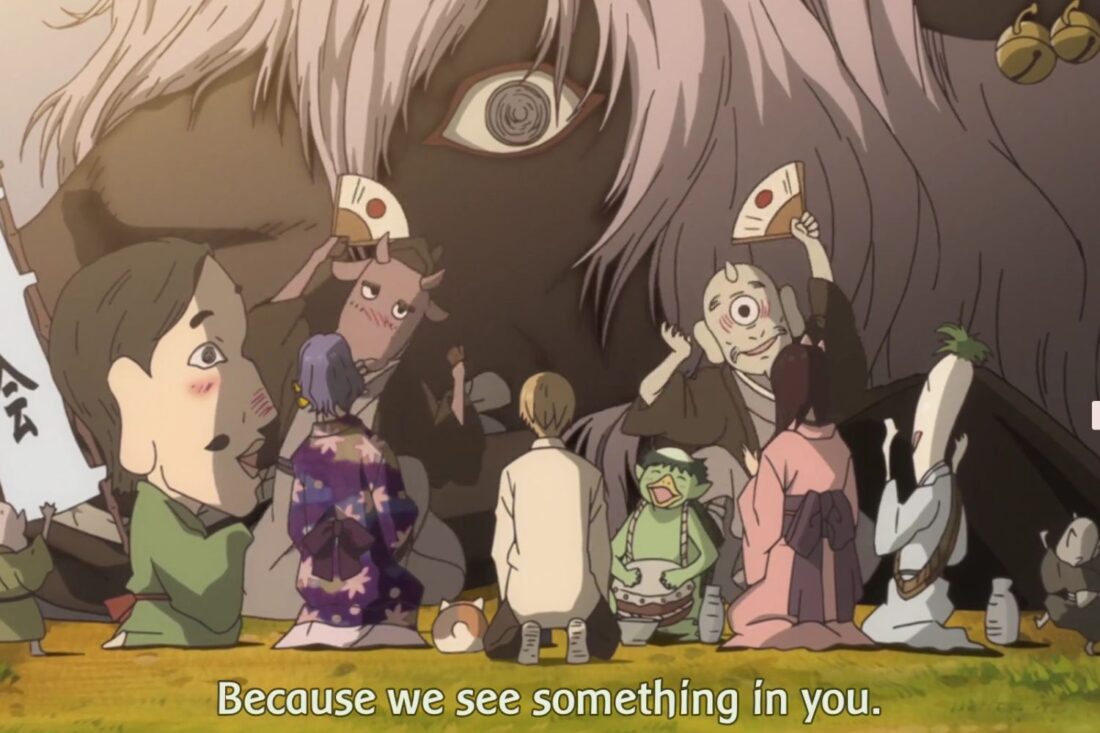
Some of the best moments of the series are those when we see Natsume through the eyes of those who know him. In a later season, an entire episode is dedicated to Touko and Shigeru, the lovely couple who have taken him in. They reflect on all his moments of strangeness and insecurity and recall how they longed to help their traumatized adoptee. They are grateful for the privilege to watch him becoming whole and happier over time, and how wondrous it is to have unexpectedly become parents late in life. As Shigeru says once, while Touka frets over Natsume returning home late, “It eases my mind to see him going out on his own. Takashi-kun is so considerate of others, but there is such a thing as being too considerate.” Natsume still refuses to share his ability to see yōkai with his relatives, however. Not because he fears rejection; he trusts them now. Instead, it’s because he doesn’t want to give them any reasons to worry.
Similarly, at times we view Natsume through the lens of the yōkai friends who have come to surround him. They are fiercely protective of him because he has always been fiercely protective of them. The powerful horse yōkai Misuzu and Hinoe, a beautiful yōkai woman who was infatuated with his grandmother, both go to great lengths to help him. He has earned their loyalty rather than their servitude, and though he never takes it for granted, it takes him aback. Whenever they invade his bedroom to ask for favors or appear in the forest shield him from the attacks of nefarious creatures, Natsume is overcome with appreciation.
…But less overcome than he once was, because Natsume, a boy who has always valued others, is learning to value himself, too.
All Hail Nyanko-Sensei!
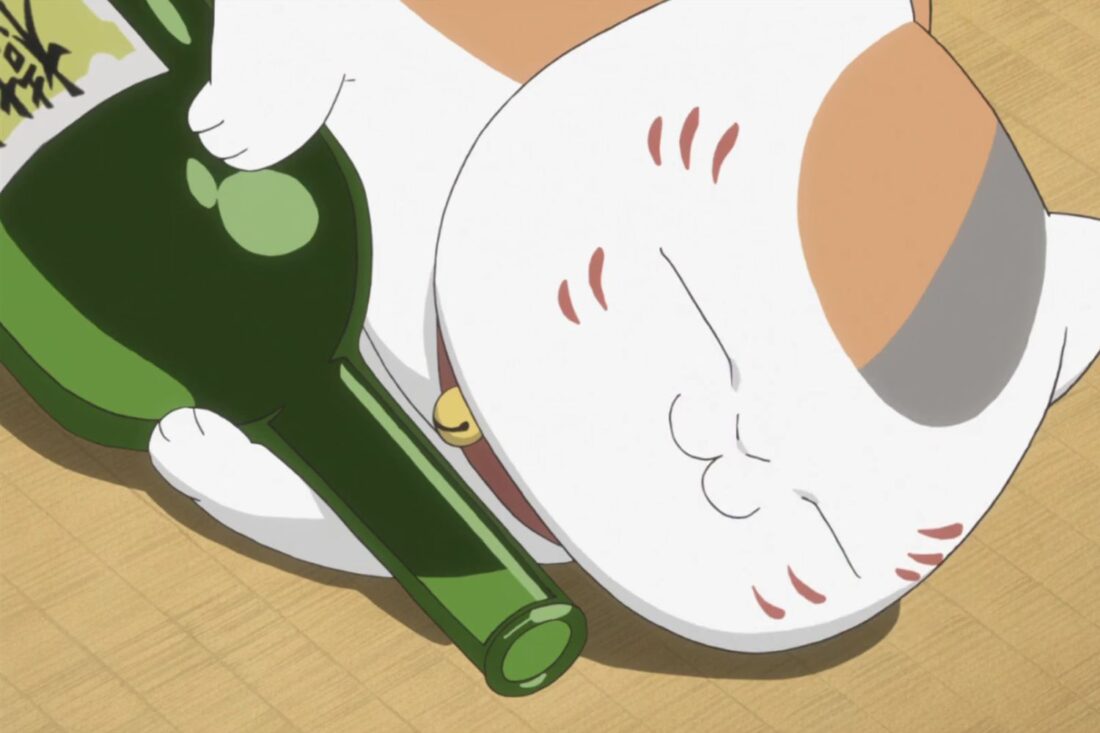
In the future I will certainly be writing more about yōkai, and I could write about this series for eternity, but I am not allowed to do that, okay, both because I have a day job and Reactor, while amazingly indulgent of my whims, has a suggested word count for essays. Madara, aka Nyanko-Sensei (Master Kitty), aka Mofumofu (fluffy fluffy), aka Ponta (Spots, basically), aka kobuta (piggy) deserves a novel of his own. Instead, let’s pay homage to this irreplaceable character here.
It isn’t surprising that even though the last Book of Friends production (aside from the wonderful ongoing manga), was released in 2018, Nyanko-Sensei merch has continued to sell like hotcakes. Yes, he’s a fat calico cat, and appeals even to those who have never seen the show. But I think the context makes him even more appealing. A fat cat who is secretly a badass shapeshfiting wolf-deity thing and also a sake lush and also a very wise friend developing his own empathy in Natsume’s company is impossibly charming.
Madara is not a mere mascot, although he certainly looks good on keychains. He is a truly powerful yōkai who chooses to appear as a lucky cat because it’s comfortable. He constantly denies that he is a cat, and of course, in almost every episode he transforms into a giant white flying wolf to protect Natsume. He also takes on the form of a human girl sometimes, a girl who looks similar to Natsume’s grandmother Reiko. “Yōkai don’t care about things like gender,” he has claimed, but his choice of human form seems a little pointed.
Nyanko has a penchant for manju and sake and other delicious foods, and in most episodes is either overeating or clutching a sake bottle in his paws. He claims to care only for himself, and yet constantly saves Natsume from harm. Initially, he agrees to be Natsume’s “bodyguard” only because Natsume has promised to bequeath the book to him. Later, he says that he stays with Natsume because “I just can’t get bored with you.”
Madara isn’t fooling anyone with that bit. If he wanted the book more than he wanted Natsume’s company, he could have let Natsume die a hundred times over. Instead, every time Natsume returns a name to a yōkai, he feigns annoyance and complains that the book is growing less powerful, but that’s about it. Nah, there’s a deep bond there, an unspoken understanding between a boy and his almost-cat. They both know it, but Natsume is too nice to call Madara’s bluff.
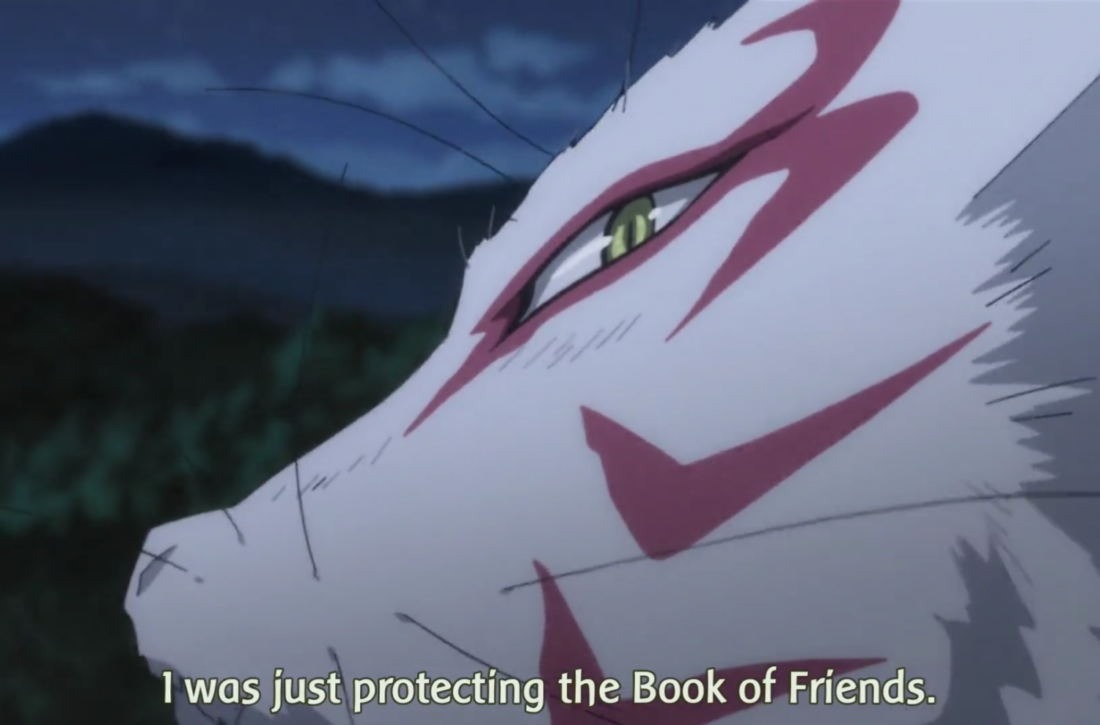
In the fourth season, after Natsume throws himself in the path of an attacking exorcist to shield Nyanko-Sensei from harm, the exorcist tells Natsume, “That creature does not like you. It does not care about you.” Later, when Nyanko confronts Natsume, Natsume knows better than to tell the truth. “I was just protecting the book of friends,” he says, throwing Nyanko’s usual phrase back at him. Nyanko, in his wolf form, smirks, and Natsume smiles, and nothing more need be said.
These two are absolute dorks and weirdos and very, very Japanese, so this is actually how they say, “I love you, dear friend.” More than any other yōkai in the series, it is Nyanko who embodies the duality of these creatures. He is powerful but gentle, terrifying but amusing, fluffy but sharp-clawed. And he is also learning to be a superb friend, though he would never admit as much. Just as he would rather die than admit to being a cat, even as he pounces to chase a string.
Ichi-go Ichi-e
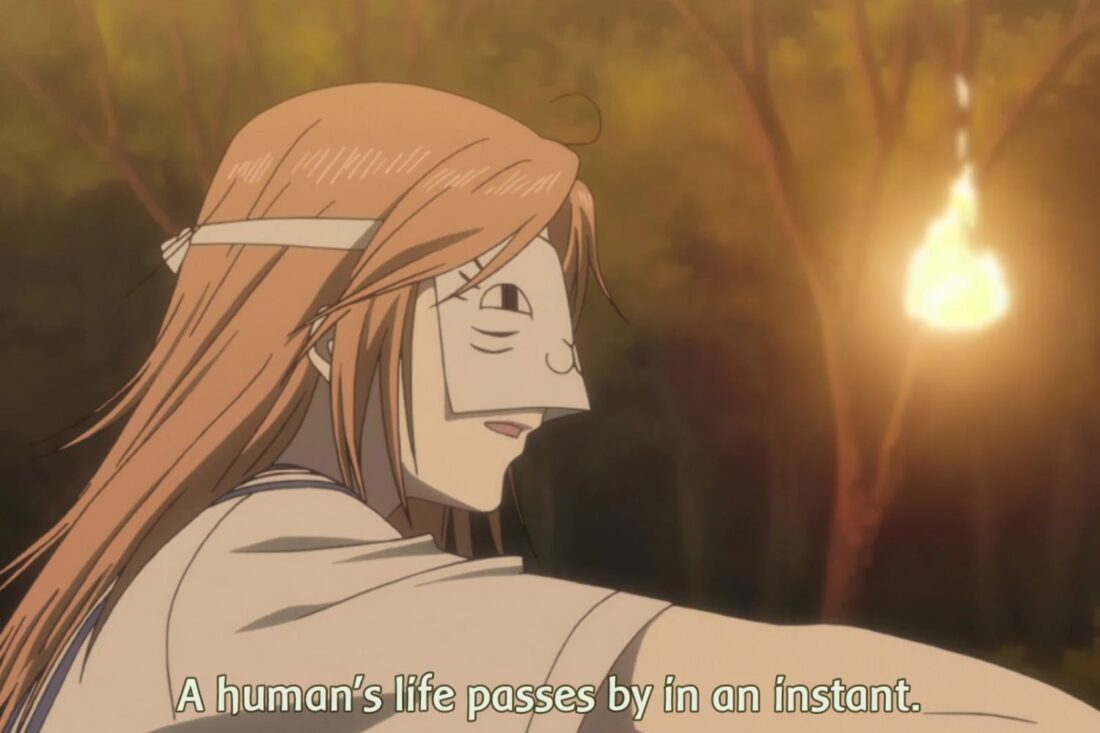
Japanese culture is renowned for celebrating the ephemeral. Every year, families gather under the cherry blossoms during hanami to say farewell to winter and welcome spring. The beauty of the blossoms, famously, lies in their short existence. Within a week of blooming, most sakura petals fall to the ground and rot. In the meantime, people revel in the showers of pink that make the world feel, briefly, magical.
“Human lives are short,” Madara tells another yōkai and a drinking party, when asked why he is spending so much time with Natsume. Natsume, too ever philosophical in his private thoughts, is all too aware of how precious and fleeting time with friends can be.
I have read criticisms that Natsume Yuujinchou as a series is slow. While I can’t speak for others and I imagine that people used to shōnen action series about chosen ones might find this anime aimless at times, I cannot think of a single episode that does not add nuance to the world and its characters. This story progresses naturally, celebrating the mundane moments of rural life and the seasons changing as its protagonist grows up. Despite all of its fantasies, Book of Friends strives to feel realistic.
Takahiro Omori, who helms this series, has been among my favorite anime directors for years. He is deliberate in his choices and always understands how much atmosphere matters. In the case of Book of Friends, the cicadas matter, the dew matters, the shifts from summer to winter uniforms matter, and fog on the breath matters, too. The annoying yōkai matter, and lost photographs matter, and classroom banter is precious enough to bottle up and keep close forever. Most seasons of the series culminate in either a festival or a social gathering. In the first season, it’s an autumn festival that Natsume attends with a little fox boy, and in the second it’s hanami, and in the third it’s a banquet Natsume’s yōkai friends hold to celebrate him. There, he plays tag with friends for the first time in his life.
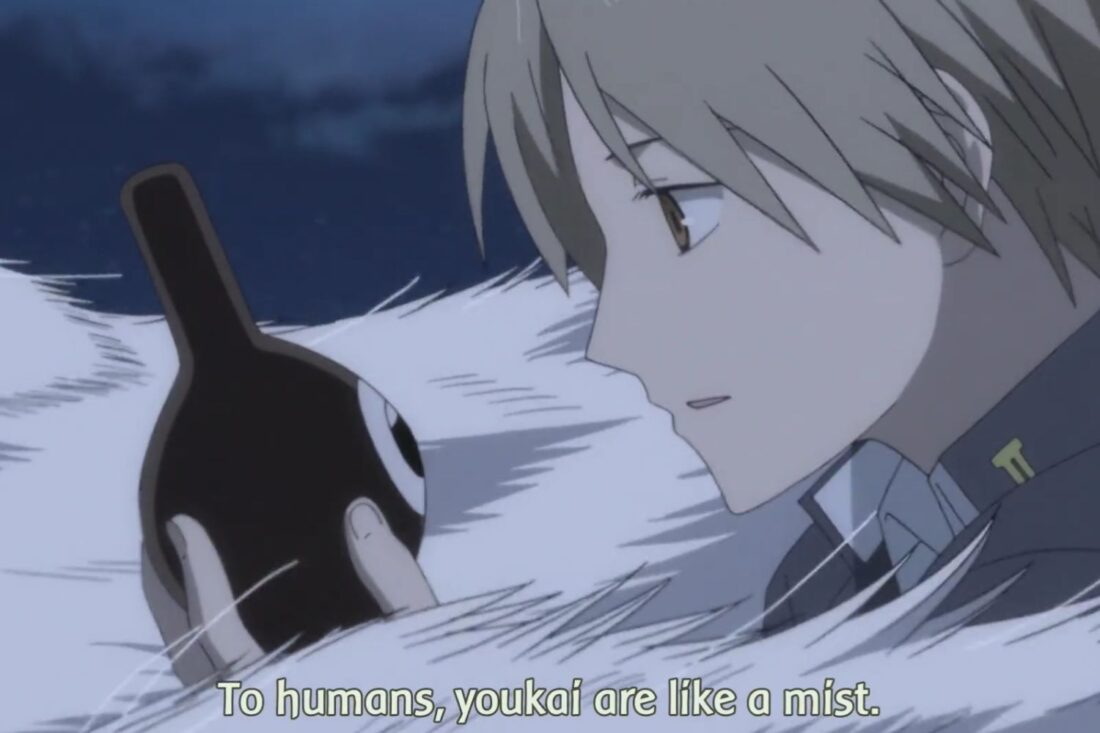
In Japan, there’s an idiom often spoken during holidays and reunions: Ichi-go, ichi e. One time, one meeting. It’s a sentiment that we can all relate to, one that may put a pang in our hearts: there is no telling when or if we will all be together again with those we love, and even if we are, it won’t be the same as it is now, because life changes all the time. Every meeting is unique.
The impact Book of Friends has on those with whom these ideas resonate is no small thing. While I have certainly met people who have never seen the show, I have never met someone who said, “I watched that show and it was okay.” Instead, those who have watched it more often say, “That’s my favorite show,” or “I rewatch it every year.”
It was inevitable that I would write this essay on what is, to me, one of the best, often unsung anime out there. I have admired this series for fifteen years now, and it has arguably changed the trajectory of my life.
I moved to Tottori, Japan, the least populous of all Japanese prefectures, in September of 2022. I was leaving an abusive workplace just outside Tokyo, and like many newcomers with rudimentary Japanese skills I hesitated when the decision was presented to me. Tottori is famously rural, so much so that even people in Japan rarely visit, despite the prefecture’s many local charms (it isn’t just the sand dunes, okay?).
But then my trainer told me that the city I was moving to neighbors a place dedicated to yōkai. Sakaiminato, a little port town where legendary mangaka Shigeru Mizuki spent his childhood, boasts an entire street dedicated to the creatures Mizuki incorporated into his iconic manga Gegege no Kitaro. The street is illuminated by eyeball streetlamps and there are yōkai statues everywhere, depicting everyone from terebii-kun, a ghost-boy emerging from a TV (he almost certainly inspired Ringu), to Betobeto san, a creepy yōkai whose clopping footsteps you might hear behind you in the dark. There’s a tiny yōkai shrine, and visitors can collect stamps and omiyage from the unique little shops that line Kitaro Road.
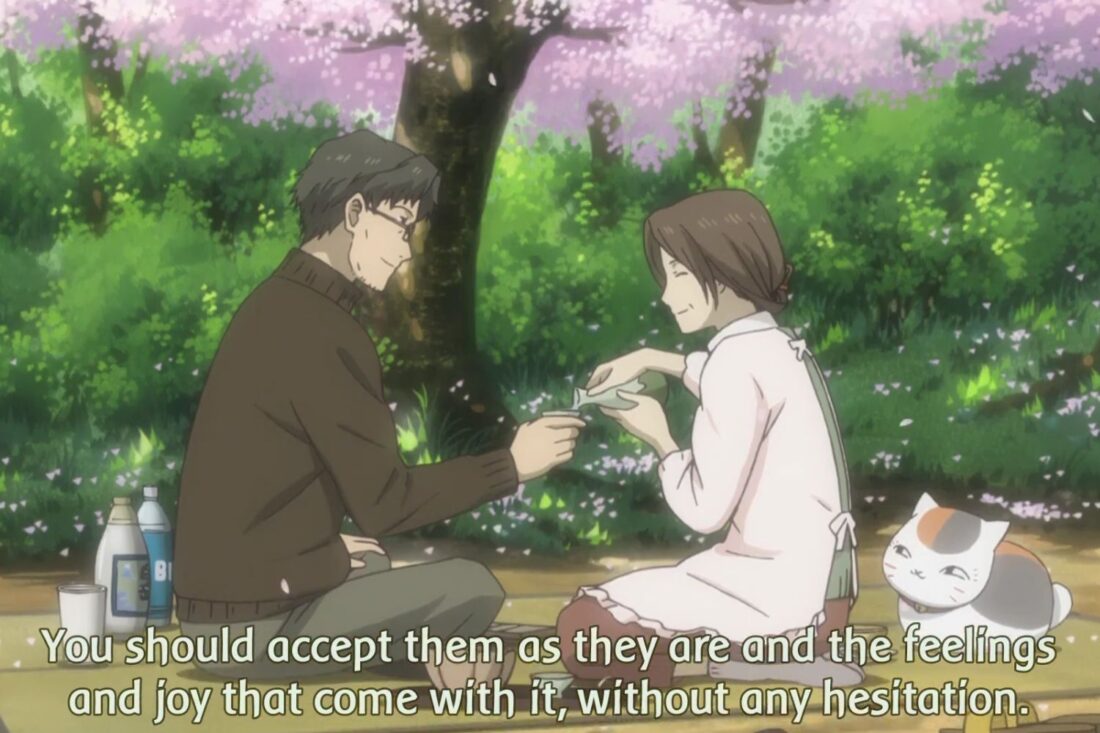
“The pace of life is slower there,” my trainer added, but at that point, I was sold.
To me, in no small part thanks to Natsume’s Book of Friends, yōkai symbolize something other than fear. A place that celebrates yōkai is a place that values history, culture, and the oddities that make life interesting. And if I have learned anything from loving Natsume and his friends, it’s this: the best things in life are often uninvited, unexpected, and challenging, too. And sometimes, the things you are most afraid of become the things you cherish most.
I boarded multiple trains and left Tokyo behind. I chose the slow life, and I chose the ghosts, and you know what? I have never once regretted it.
Have any series changed your life like this one did mine? And what other premieres are you thrilled about this Fall anime season, other than Uzumaki? This weekend I’ll be making a night-bus pilgrimage all the way to Nagoya to visit the Ghibli Park, so expect a little Ghibli retrospective next time. Later this month, it’s time for Halloween—I’ll be writing about body horror in anime, discussing series like Parasyte and the works of Junji Ito, as well as my new obsession, the recent horror gem The Summer Hikaru Died. It’s spooky season! Any recommendations?










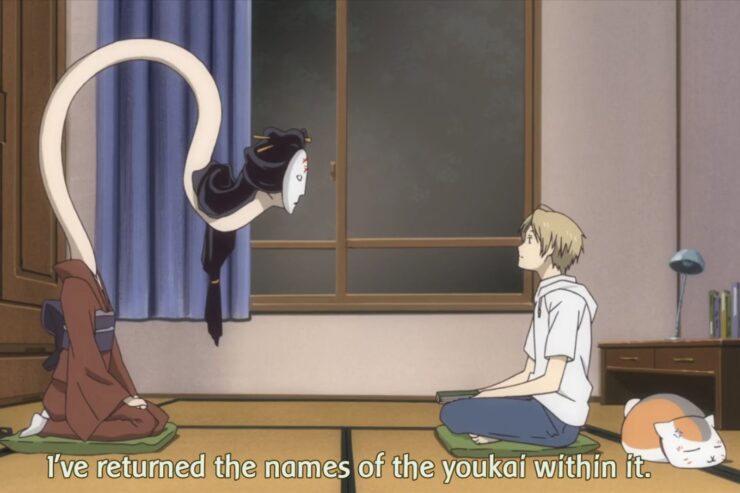
For my spooooooooky heck-ommendation, I’d go with Dark Gathering, a rare horror-themed anime that is genuinely creepy.
I know nothing at all about this series, and that’s awesome! I’ll give it a peek, thanks!
It’s on Hidive, which is why you may have missed it. Alternately, you can read the source manga.
I love this series so much. And I found, to my surprise, that I have come to genuinely love a fictional character in Natsume. It’s not that he’s a good person, though he is. It’s that his alienation from those around him is something many of us can identify with, and his gradual learning to trust those around him and himself because of his great heart touches me deeply. I want to protect him on his journey maybe because it’s a journey I want to accompany him on.
The series is masterfully written to touch us emotionally. More often than not I end up crying during watching it, in a good way. All the beings in it have lives that matter, and many of the lonely characters find links with Natsume that show them that at least for a little while, they had a friend.
I completely agree on all fronts. I first started watching the series in college, right when I began getting into anime, after binging a slew of action-packed shounen series, because I am a sucker for all things supernatural. And at first, I was taken aback by the pace and the calm, because it was so different from other series I had seen then. But that feeling was soon replaced by a genuine appreciation for the show’s approach to character and Natsume’s genuine goodness as a person. He is that character that deserves to be protected and deserves to be appreciated, The audience realizes long before he does that he is finally in a place among people who truly care for him. It’s downright healing.
The series improves on a rewatch for these reasons, too, because sometimes the growth of his character is only obvious in retrospect. And yes, anyone would be lucky to be friends with someone like Natsume.
Sounds interesting, where can I watch it? I am finding it on Crunchyroll, but only from season 4. Is the beginning currently available anywhere?
The first three seasons are lumped together on Crunchyroll as one season under the Japanese title, Natsume Yujin-cho.
This gets tricky for me, because I’m in Japan and all seasons are available on Netflix. It varies by region, but is it on Netflix in yours?
I adore Natsume’s Book of Friends! I couldn’t click on this article quickly enough, and was not disappointed in the least. I also love the gentleness of this series, as well as the love and compassion clearly woven throughout it. The occasional spooky moments are welcome as well, of course. :)
As for recommendations–In/Spectre has an interesting take on yokai/human interactions, and can be a little spooky sometimes as well. It’s very different from the feel of Natsume: it’s a mystery series through and through, with a tough-as-nails main character who proves over and again that appearances can be deceiving.
Again, you prove that those who find this show fall in love with it! And yes, cozy-spooky is such a rare and wonderful subgenre and few series nail it like this one. Also, the amount of research that author Yuki Midorikawa puts into the folklore of the region is so thorough and so consistent. Honestly, it feels disingenuous that I didn’t talk about her specifically in the article. There’s just so much to say about this one.
I have had In/Spectre on my list for a while, so I’ll move it up the list. These days the backlog is insane, but what’s nice about writing for Reactor is the freedom to write about any series from any season from any decade for any reason!
I love the show, but I’m behind on it and trying to catch up. I have read the manga up through what’s current in the U.S., though, and I love it so much. I cry at a lot of episodes.
I mean, it isn’t the sort of show that needs to be binged, but savored! I plan to wait for this season to end to watch it. And yes, it really does pull on the heartstrings.
Lovely essay! I try to get my friends with Crunchyroll to watch it. I would like to note that it’s Tanuma (Tanuma Kaname), not “Takumi”.
Oh ye gods, thanks for that! I am prone to mixing up article names with names of current acquaintances and students for some stupid reason. And Tanuma deserves better!
Updated, thanks!
Another devoted lover of this anime and it’s characters here! It’s my very favourite iyashikei show.
One thing I was surprised you didn’t touch on when explaining some of the multitudinous charms of this series is the music in general and most especially the OP/EDs, particularly for the first four seasons. I expect that was a victim of the limited length, along with so much else, alas!
Season 2’s OP is easily my favourite because of the way it shows you all these brief, seemingly random shots everyday life and nature, but then comes back and shows you the same shots again, only with the yokai visible this time, and every single yokai shown in the opening has an important role somewhere within the season. Ano hi Time Machine certainly pulls it’s own weight there too, though. For the EDs, I love the first three best of all. I think ED2 (Aishiteru) very narrowly edges in front again because of it’s wonderful visuals of the people that have come into Takashi’s life, but wow, do the performances of ED1 (Natsu Yuuzora) and ED3 (Kimi no Kakera) utterly wreck me every time with the MASSIVE levels of wistful melancholy they bring. Kousuke Atari does both of these masterfully.
I like the enduring mystery of Reiko, and how very little we know about her, her life and motivations, and what scraps we do learn are almost all inferences from little facts we learn from the way she did some things. The second season episode regarding the name tied to the top of a tree is the perfect example of this: Despite her cold and distant exterior and action on the surface, she was seemingly kind but super awkward and rather obscure in her reasons. Though it is also clear that getting on her bad side was A Very Bad Idea.
In my headcanon she actually did have a happy, if short, life after high school.
In fact, I love how pretty much all of the characters, human, yokai or other are displayed and developed more by the negative spaces around them, rather than directly displayed, as it were. Misuzu and Hinoe are also wonderfully cryptic in many ways, but clearly care and look out for Takashi, even if he doesn’t realise it at first. On the other hand, Nyanko-sensei’s goofy drinking buddies are always fun to see, and their very obvious fear of humans is hilarious to see in a pair of yokai. (If obviously not at all fun for them, poor dears.)
For some reason, I have had almost no luck at all in convincing anime-watching friends to share my deep love with this series, but then iyashikei shows do seem to be highly variable in their impact from one person to another. One of them utterly adores Aria and all it’s seasons, but it just leaves me barely whelmed. They seem to feel similarly about Natsume Yuujinchou in return, alas.
As for recommendations, I shall suggest another iyashikei anime that I loved, with a similar ‘feel’ (despite the complete lack of any fantastic elements) of someone very isolated and lonely slowly growing out of their shell, making friends and expanding their world: Super Cub.